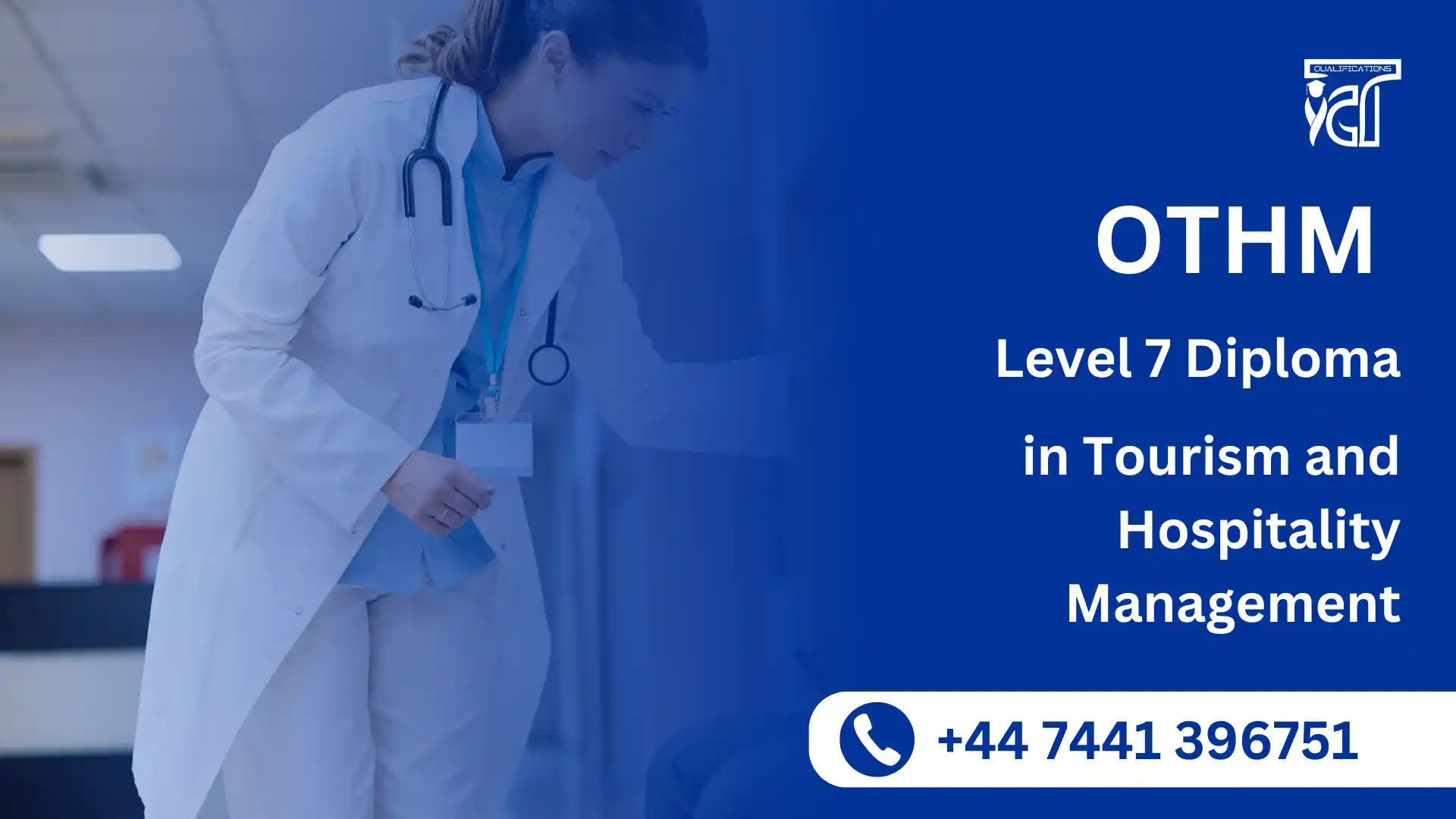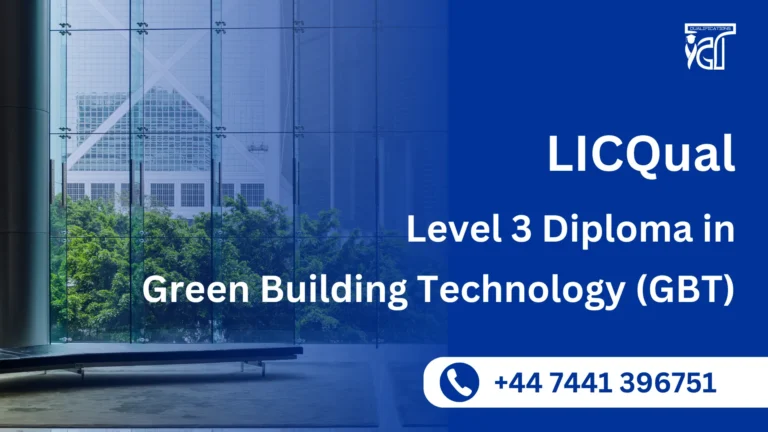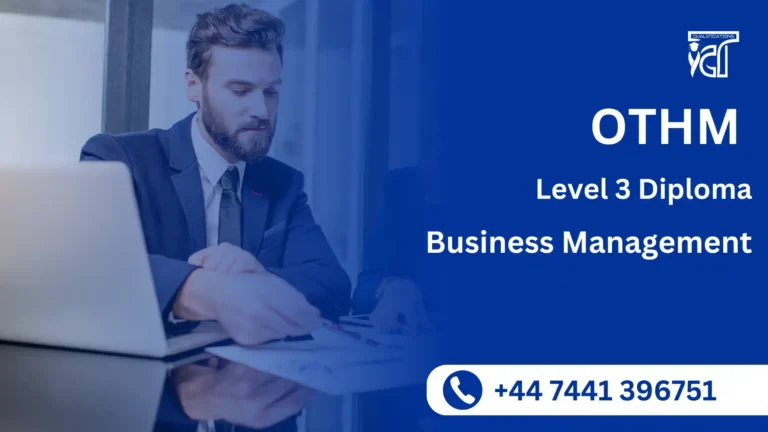In the rapidly evolving world of tourism and hospitality, effective leadership and strategic management are essential to driving success. The OTHM Level 7 Diploma in Tourism and Hospitality Management provides a pathway for professionals seeking to enhance their expertise and take on senior leadership roles within the industry. This Ofqual-regulated qualification is tailored for those looking to develop advanced managerial skills and a deep understanding of the tourism and hospitality sectors.
The OTHM Level 7 Diploma in Tourism and Hospitality Management is a comprehensive and rigorous qualification designed for individuals pursuing senior roles in the tourism, hospitality, and events management industries. Recognized by Ofqual (the Office of Qualifications and Examinations Regulation), this qualification meets national standards and provides learners with the knowledge and tools required to lead and manage complex organizations in these sectors.
The qualification is entirely assignment-based, focusing on practical, real-world applications of management principles. This flexible approach allows learners to engage with the course material in a way that fits their schedule, applying their learning directly to their professional context.
The OTHM Level 7 Diploma in Tourism and Hospitality Management offers a unique opportunity for professionals in the industry to enhance their management and leadership capabilities. With its Ofqual-regulated status, assignment-based assessment, and globally recognized curriculum, this qualification prepares learners for senior roles in the tourism and hospitality sectors. Whether you are looking to climb the career ladder, broaden your skill set, or gain a competitive edge in a global market, this course will provide you with the tools and knowledge necessary for success.
OTHM Level 7 Diploma in Tourism and Hospitality Management
The OTHM Level 7 Diploma in Tourism and Hospitality Management includes 6 mandatory units, offering a total of 120 credits. The qualification requires 1,200 hours of Total Qualification Time (TQT) and 600 Guided Learning Hours (GLH) upon completion.
| Sr# | Unit Title | Credits | GLH |
|---|---|---|---|
| 1 | Strategic Management and Marketing | 20 | 100 |
| 2 | Destination Management | 20 | 100 |
| 3 | International Tourism Policy and Development | 20 | 100 |
| 4 | Digital Tourism and Hospitality | 20 | 100 |
| 5 | Organisational Behaviour in International Contexts | 20 | 100 |
| 6 | Advanced Research Methods | 20 | 100 |
GLH (Guided Learning Hours) and TQT (Total Qualification Time) are terms commonly used in vocational qualifications to help define the amount of time a learner is expected to spend on heir studies.
1. GLH (Guided Learning Hours)
GLH refers to the number of hours a learner spends being directly taught, supervised, or supported during their course. This includes the time spent in activities such as:
- Classroom instruction
- Practical workshops
- One-on-one tutoring or mentoring sessions
- Online learning sessions with tutor support
In other words, GLH represents the time that learners are actively engaged with their instructors or learning activities.
2. TQT (Total Qualification Time)
TQT represents the total amount of time a learner is expected to invest in completing a qualification, including:
- GLH (Guided Learning Hours): Time spent on direct learning, as explained above.
- Self-Directed Learning: This includes time spent on independent study, research, assignment completion, preparation for exams, and any other work the learner does outside of direct teaching hours.
TQT is a broader measure that includes all the time required to achieve the qualification. It helps learners and employers understand the overall commitment required for the qualification.
Key Differences Between GLH and TQT:
- GLH focuses on direct learning with guidance or supervision.
- TQT includes GLH as well as independent study time and other learning-related activities.
Example:
If a qualification has a TQT of 600 hours and a GLH of 250 hours, it means the learner should spend 250 hours in direct learning (classroom, online, or tutor-led sessions) and 350 hours on independent study or research.
Learning Outcomes of OTHM Level 7 Diploma in Tourism and Hospitality Management
Strategic Management and Marketing
- Be able to analyse the strategic management approach in the tourism and hospitality context.
- Be able to analyse strategic approaches to marketing in tourism and hospitality organisations.
- Be able to assess the impacts of environmental factors on strategic management and marketing in tourism and hospitality organisations.
- Be able to research information from a range of academic and industry sources.
Destination Management
- Understand the factors that influence destination management.
- Understand the role of destination management organisations
- Be able to evaluate the influence of stakeholders on destination management
- Understand the relationship between destination management and destination marketing.
Tourism Policy and International Development
- Be able to analyse the concepts and theories of public policy for tourism.
- Be able to evaluate theories of international development.
- Understand the impact of international tourism development.
- Be able to develop plans for tourism projects to address international development problems
Digital Tourism and Hospitality
- Understand the impact of technology on the development and growth of the tourism and hospitality industry.
- Understand the emergence of the digital tourism concept and its associated theories.
- Understand the impacts of social media on the tourism and hospitality industry.
- Understand the legal and ethical implications of technological change in the tourism and hospitality industry.
Organisational Behaviour in Tourism and Hospitality
- Understand organisational behaviour theories relevant to the tourism and hospitality industry.
- Understand the performance of international tourism and hospitality organisations in relation to their external environment and internal structures.
- Be able to evaluate crosscultural management trends and developments and their implications for the tourism and hospitality industry.
- Understand developments in international human resources management and their implications for organisations in the tourism and hospitality industry.
Advanced Research Methods
- Be able to critically evaluate research philosophies and their application to tourism and hospitality research.
- Understand the role and approaches to research in a tourism and hospitality context.
- Be able to plan research projects.
- Be able to critically analyse a range of data to produce research outputs.
Course Benefits of the OTHM Level 7 Diploma in Tourism and Hospitality Management are as :
Ofqual Regulated Qualification: The OTHM Level 7 Diploma in Tourism and Hospitality Management is a fully Ofqual-regulated qualification, ensuring it meets the highest standards of quality and is recognized both in the UK and internationally. This provides credibility and value to your qualifications.
Assignment-Based Assessment: This course is entirely assignment-based, offering a practical and flexible approach to learning. By focusing on real-world assignments, learners can directly apply theoretical knowledge to professional situations, enhancing their problem-solving and critical thinking skills.
Comprehensive Industry Knowledge: The curriculum covers a wide range of topics essential for effective leadership in the tourism and hospitality sectors, including strategic management, marketing, customer service, and financial management. This comprehensive knowledge equips graduates to handle complex industry challenges with confidence.
Career Advancement: The OTHM Level 7 Diploma prepares learners for senior roles within tourism and hospitality management, such as Hotel Manager, Operations Manager, or Director of Tourism. The qualification provides the expertise needed to take on higher responsibilities and move into leadership roles.
Global Recognition: The qualification is recognized globally, providing access to career opportunities in both domestic and international tourism and hospitality markets. This is particularly beneficial for professionals who wish to pursue career advancement abroad.
Flexible Learning: The assignment-based structure allows learners to study at their own pace, making it ideal for busy professionals. This flexibility enables students to balance work and study commitments while gaining valuable skills for career progression.
Practical Application of Skills: The focus on assignments allows learners to apply their knowledge directly to real-life industry situations. This approach ensures that students are better prepared to handle the complexities of tourism and hospitality management, making them job-ready upon graduation.
Development of Leadership and Management Skills: The course fosters strong leadership, management, and strategic planning skills. Learners will develop the ability to lead teams effectively, manage large-scale operations, and create strategies that drive business success in the tourism and hospitality industries.
Supportive Learning Environment: Throughout the course, learners have access to expert tutors, resources, and feedback, which supports continuous improvement and enhances understanding of key concepts. This creates a nurturing learning environment that helps students succeed.
Pathway to Further Education: Upon completion, the OTHM Level 7 Diploma serves as a stepping stone to further academic pursuits, such as an MBA or other postgraduate qualifications in business or hospitality management.
The OTHM Level 7 Diploma in Tourism and Hospitality Management is designed for professionals who are looking to develop their leadership and strategic management skills in the tourism and hospitality sectors. The ideal learner for this course typically has the following characteristics:
- Mid to Senior-Level Professionals: This course is ideal for individuals who are already in mid to senior management roles in the tourism, hospitality, or related industries. The qualification is tailored to those who aspire to progress into more strategic or leadership positions such as Hotel Manager, Director of Operations, or General Manager.
- Experience in Tourism or Hospitality: Ideal learners will typically have a background in tourism, hospitality, or a related field, with several years of professional experience. This course builds upon existing knowledge, so learners should be able to relate the course content to their real-world work experience.
- Ambitious Career Seekers: The ideal candidate is someone who is eager to advance their career by acquiring advanced managerial and strategic leadership skills. The course is designed to help learners take on greater responsibility and lead teams or organizations within the tourism and hospitality sectors.
- Aspiring Leaders and Managers: Those looking to enhance their leadership, decision-making, and management abilities will find this course particularly beneficial. It focuses on strategic thinking, financial management, and operational excellence, making it ideal for individuals who wish to manage large teams and organizations.
- Professionals Seeking Flexible Study Options: The assignment-based structure makes this course suitable for individuals with busy schedules who wish to balance their studies with professional commitments. Ideal learners are self-motivated and able to work independently to complete assignments while continuing to work in the tourism and hospitality sectors.
- Global Career Aspirants: The qualification is globally recognized, so professionals who aim to work in international tourism and hospitality markets will benefit greatly. Ideal learners are those who wish to expand their career opportunities beyond their home country and pursue roles in multinational or global hospitality organizations.
- Entrepreneurs and Business Owners: Entrepreneurs or business owners in the tourism and hospitality industries who are seeking to enhance their operational and strategic management skills can also benefit from this qualification. The course provides valuable insights that can help improve business performance and drive growth.
- Aspiring to Further Education: For learners who wish to continue their academic journey, this qualification serves as an excellent foundation for further study, such as an MBA or other advanced postgraduate qualifications in business or hospitality management.
Overall, the ideal learner for the OTHM Level 7 Diploma in Tourism and Hospitality Management is someone who is committed to professional development, seeking to improve their leadership skills, and aiming to make a significant impact in the tourism and hospitality industry.
Entry Requirements
Register Now
Qualification Process
Qualification Process OTHM Level 7 Diploma in Tourism and Hospitality Management
- Self-Assessment:
Begin by evaluating your eligibility to ensure you meet the qualification requirements, including work experience, knowledge, and language proficiency. - Registration:
Complete your registration by submitting the required documents, including a scanned copy of a valid ID, and paying the registration fee. - Induction:
An assessor will conduct an induction to confirm your eligibility for the course and explain the evidence requirements. If you do not meet the criteria, your registration will be canceled, and the fee will be refunded. - Assignments & Evidence Submission:
Provide all assignments and the necessary evidence based on the assessment criteria outlined in the course. If you are unsure of the required evidence, consult with the assessor for guidance on the type and nature of evidence needed. - Feedback and Revision:
The assessor will review your submitted evidence and provide feedback. Evidence that meets the criteria will be marked as “Criteria Met,” while any gaps will be identified. You will be asked to revise and resubmit if needed. - Competence Evidence:
Submit final evidence demonstrating that all learning outcomes have been met. This evidence will be marked as “Criteria Met” by the assessor once it is satisfactory. - Internal Quality Assurance (IQA):
The Internal Quality Assurance Verifier (IQA) will review your evidence to ensure consistency, quality, and compliance with standards. - External Verification:
The IQA will submit your portfolio to OTHM External Quality Assurance Versifier (EQA) for final confirmation. The EQA may contact you directly to verify the authenticity of your evidence. - Certification:
Upon successful completion of all checks, OTHM will issue your official certificate, confirming that you have attained the OTHM Level 7 Diploma in Tourism and Hospitality Management







